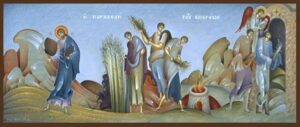Introduction: For hundreds of years many Christian traditions have read passages of scripture using a tool called a lectionary. During this ordinary season, our devotional team decided to resource you with selections from the Revised Common Lectionary.
Source: the Revised Common Lectionary Year A
(Note. If you desire to read these passages in a different version of the Bible, this link will provide all the readings for week 5 in ESV in Bible Gateway where you may also choose other versions of these passages.)
Matthew 13:24-30, 36-43
13:24 He put before them another parable: “The kingdom of heaven may be compared to someone who sowed good seed in his field;13:25 but while everybody was asleep, an enemy came and sowed weeds among the wheat, and then went away.
13:26 So when the plants came up and bore grain, then the weeds appeared as well.
13:27 And the slaves of the householder came and said to him, ‘Master, did you not sow good seed in your field? Where, then, did these weeds come from?’
13:28 He answered, ‘An enemy has done this.’ The slaves said to him, ‘Then do you want us to go and gather them?’
13:29 But he replied, ‘No; for in gathering the weeds you would uproot the wheat along with them.
13:30 Let both of them grow together until the harvest; and at harvest time I will tell the reapers, Collect the weeds first and bind them in bundles to be burned, but gather the wheat into my barn.'”
13:36 Then he left the crowds and went into the house. And his disciples approached him, saying, “Explain to us the parable of the weeds of the field.”
13:37 He answered, “The one who sows the good seed is the Son of Man;
13:38 the field is the world, and the good seed are the children of the kingdom; the weeds are the children of the evil one,
13:39 and the enemy who sowed them is the devil; the harvest is the end of the age, and the reapers are angels.
13:40 Just as the weeds are collected and burned up with fire, so will it be at the end of the age.
13:41 The Son of Man will send his angels, and they will collect out of his kingdom all causes of sin and all evildoers,
13:42 and they will throw them into the furnace of fire, where there will be weeping and gnashing of teeth.
13:43 Then the righteous will shine like the sun in the kingdom of their Father. Let anyone with ears listen!

Spend some time enjoying this picture of the parable of the wheat and the tares. It begins on the left with the farmer, who is good and sows good seeds. If you garden you understand this emotion: it is easy to get deeply attached to the things you are growing, and deeply frustrated with the weeds that shoot up amongst them.
In the right side of the scene we watch the moment of the harvest when wheat and tares are separated. Our tendency might be to worry as to which we might be. Are we wheat or tares — good or bad? But that does not seem to be the heart of the parable.
At its heart, the parable encourages us: to refuse the temptation in this life to judge others, to resist our tendency to make assumptions about those around us. It appears to be an encouragement that we should allow God to be the judge of all, in his good timing.
How do you see yourself in this parable? Which part of it do you identify with?
How are you tempted to judge those around you? What do you think the motivation for that is?

